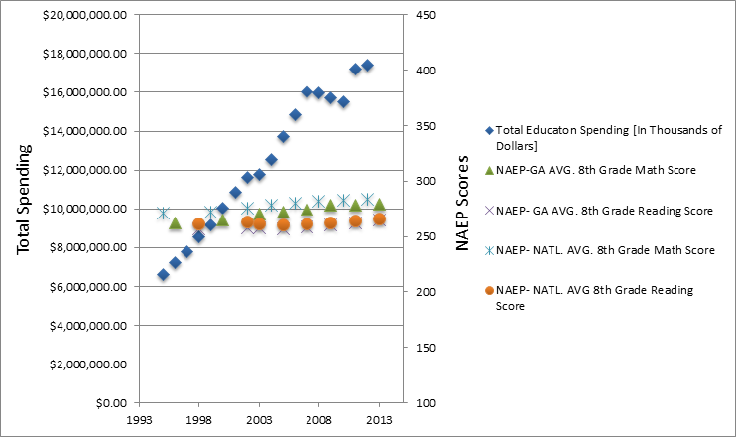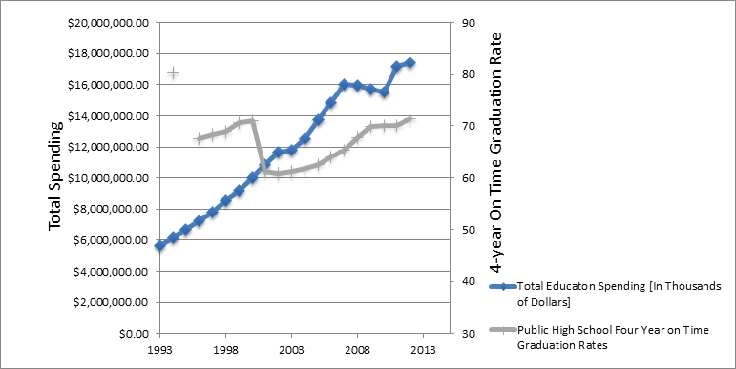by Georgia Center for Opportunity | Feb 23, 2015

Attempts at reforming the public education system in Georgia are not new. Even just looking over the last 20 years, numerous reform efforts have been introduced as a means to improve educational outcomes among the state’s youth. Some of these ideas have had a better effect than others, yet as a whole they have not achieved the level of progress Georgia has hoped for. While modest gains have been made in the National Assessment of Educational Progress (NAEP) scores for eighth grade students and the graduation rate for high school students has risen since 2002, Georgia still has a grade of C-Minus overall and one of the lowest graduation rates in the country.
Below is a list of reforms that Georgia has tried since the introduction of the Hope Scholarship and the charter school law that was passed in 1993. Comparing these reforms to the two graphs that follow demonstrates that achievement among Georgia’s eighth grade and high school students has been relatively stagnant compared to the amount of money spent to improve education over the last two decades.
Past Reforms
1993 – HOPE Scholarship created and funded by lottery. Charter school law passed; only public schools can convert to charters; commissioned by local and state board.
2000 – A+ Education Act mandates end-of-course assessments and Criterion-Referenced Competency Test (CRCT) in core subjects.
2001 – No Child Left Behind and Title I grants public schools with high percentages of students receiving free or reduced lunch additional federal funding.
2005 – Georgia Performance Standards implemented as a result of Quality Core Curriculum (QCC) reform to align with national standards.
2008 – HB 881 creates the Georgia Charter Schools Commission. Qualified Education Expense (QEE) Tax Credit Bill passed (HB 1183).
2009 – American Recovery Reinvestment Act; Georgia received almost $2 billion dollars to invest in education. HB555 requires local schools systems to grant charters within the district access to unoccupied buildings at no cost.
2010 – As a result of Common Core State Standards initiative, Georgia adopts new content standards in language arts, math, science, and social studies.
2011 – HB881 Georgia Charter Commission declared unconstitutional; 16 charters, 15,000 students impacted. QEE Tax Credit Bill amended (HB 325) creating student scholarship organizations (SSOs); individual and corporate taxpayers can contribute to SSOs in exchange for a state tax credit.
2012 – Amendment One passes and Georgia Charter Commission is reinstated. College and Career Performance Readiness Index (CCPRI) conducted “study year” of public schools’ performance.
2013 – Tax Credit Bill amended (HB283); cap increased to $58 million. Career Clusters curriculum implemented in schools.
2014 – Students are to take Georgia Milestones instead of CRCT and EOCT. Charter schools reach a total of 315.
- 77 start-ups
- 31 conversions
- 207 charter system schools
- 16 charter systems
- 13 state commissioned specialty schools
- 13.5% of total student population
Total Spending vs. NAEP Scores

Total Spending vs. High School Graduation Rate

It seems that Georgia will have to do something different than what has been attempted thus far if we want to experience real gains in educational outcomes among K-12 students – something different than pumping more money into the current system, aligning state curriculum to national standards, or allowing only a limited number of parents and students school choice. We need greater options that ensure tax dollars are well spent and students’ educational needs are met. Only then will be begin to see a more dramatic increase in the number of high school graduates who are ready for college, career, and life.
by Georgia Center for Opportunity | Feb 11, 2015

Georgia’s public school system is failing many of our children, and it seems everybody has an opinion in regard to what needs to happen. But one truism has become apparent: More money is not the solution.
Nationally, spending on public education in constant dollars has nearly tripled since 1970, and the expenditures per student have doubled from $4,500 per student per year in 1970 to almost $11,000 today.[1] During this same time period, the National Average for Educational Progress (NAEP) scores for 17-year-olds have remained essentially unchanged. Americans spend more money per-student than any other nation in the world while only performing in the middle-to-back of the pack among developed countries.
While an increase in spending has not yielded higher achievement scores among U.S. students, it has been successful in accomplishing one thing: increasing the size of school administration. Since 1950, the overall number of school administrators in the U.S. has risen by a staggering 702 percent, while the number of teachers has only grown by 252 percent, and the number of students has increased by only 96 percent.[2] For all this growth in school administration and faculty, the outcomes in student achievement have been disappointing.
The same can be said for Georgia. Spending on public education increased drastically from $5.6 billion in 1993 to $17.4 billion in 2012, yielding an improved student-teacher ratio during this time period (16.7 in 1993 to 15.6 in 2012). Yet despite all this spending and having more teachers and smaller classroom sizes, NAEP scores for eighth grade students in Georgia remained virtually the same. Similarly, the high school graduation rate did not improve significantly during this time period, going from 67.6 percent in 1996 to 71.5 percent in 2012, while hitting a low of 60.8 percent in 2002.
Both in Georgia and nationally we continue to operate under the assumption that more money and more staff will solve the problem of a failing educational system. However, statistic after statistic indicates that pouring more money into Georgia’s failing public school system will not provide any substantial improvement, especially for Georgia’s most vulnerable children. There have, and continue to be, serious and well-intentioned efforts to reform the system. But because these reforms only provide minor changes to the system without seeking to change the way the system is organized, they limit themselves to minor improvements in standardized test scores.
In order to improve the educational opportunities we give Georgia’s children and ensure that the money spent on public education is not wasted on poor results, Georgia needs a new and innovative approach to education – an approach that gives parents the power to see their children succeed in education and in life. We need quality instruction that meets the needs of an enormously diverse group of students in a broad range of circumstances.
This just might be the power that newly proposed Education Savings Accounts offer.
Notes
[1] McShane, Michael. How America’s Education System Fails to Live Up to Its Promises (Washington, DC: AEI Press, 2015).
[2] Ibid.
by Georgia Center for Opportunity | Feb 6, 2015

According to the most recent data released by the National Center for Education Statistics this January, Georgia’s high school graduation rate is still one of the lowest in the nation at 72 percent, despite good improvement over the last two years. Only three states and the District of Columbia have a lower graduation rate than Georgia. Compare this to such states as Nebraska, New Jersey, North Dakota, Texas, and Wisconsin, which all have a graduation rate of 88, and Iowa which leads the pack at 90.
Georgia’s struggles don’t end with its graduation rate. Education Week released the latest report cards for each state this January in the categories of Chance-for-Success, School Finance, and K-12 Achievement in its 19th annual Quality Counts – Preparing to Launch: Early Childhood’s Academic Countdown. Georgia earned a grade of C-Minus and a ranking of 31st overall amongst the 50 states, based on its rankings of 37th, 31st, and 17th in each respective category. Georgia is below the nation as a whole, which earned a grade of C.
It would be one thing if Georgia ranked near the middle of the pack in a country whose educational outcomes far exceeded those of other developing countries around the world. However, when comparing how the U.S. education system stacks up on the international playing field, the results are not promising.
The Programme for International Student Assessment (PISA) assessed the competencies of 15-year-olds in reading, mathematics, and science in 65 countries and economies in 2012. Among the 34 countries who are members of the Organisation for Economic Co-operation and Development (OECD), the U.S. performed below average in mathematics, ranking 27th, and close to the OECD average in reading and science, ranking 17th and 20th respectively. According to PISA, U.S. students’ performance has not changed significantly over time despite the U.S. spending more per student than most countries.
So, what do these statistics teach us?
If Georgia stands in the middle of the pack when compared to other states in educating our children, in a country that is in the middle-to-the-back of the pack among developed countries, it’s safe to conclude that as a state we are failing to produce the level of excellence we desire for our children in an increasingly globalized economy.
Far too many students are stuck in failing schools that stifle them from reaching their full potential simply because their zip code affords them no other options. As a state, we cannot afford to let students spend another day in a failing school. The cost is too high individually and collectively.
Mediocre results call for a change in the status quo. Instead of keeping the same old system that is failing to produce the outcomes we hope to see, why not try a different strategy?
by Eric Cochling | Feb 4, 2015

We are very pleased to report that Rep. Mark Hamilton introduced a bill today to create Education Savings Accounts (ESAs) in Georgia (Read HB 243: “Education Savings Account Act”). ESAs are a terrific way to give parents and their students a choice when it comes to education. They’re flexible, allow for parents to tailor their child’s education, and they allow the money to follow the child. It’s everything you want in a great school choice program.
For more info, read our press release on the legislation.
*UPDATE: February 9, 2015
Senator Hunter Hill introduced a bill to create ESAs in Georgia: Read SB 92
by Georgia Center for Opportunity | Feb 3, 2015

There is buzz under the gold dome about the potential for a bill proposing Education Savings Accounts (ESAs) for Georgia’s students and parents. ESAs have earned the praise of many as the “next generation of school choice.”
Here is a run down of how they work and their potential advantages: Parents who choose not to enroll their children into public schools full time can receive 100% of what the state would have spent on their children at a public school – a change that is revenue neutral for the State and gives freedom to parents. The Department of Education deposits funds directly into a privately managed bank account, which parents or guardians can access through a restricted-use debit card. Child-specific factors – such as disabilities – may determine the amount of money distributed into a family’s ESA. Parents or guardians can then spend the money on private school tuition, online learning curriculum, special education services and therapies, textbooks, and a number of other qualifying education-related services and providers. Furthermore, parents can save unused funds from year to year and roll the funds into a college savings account.
Parents and students can use ESAs to tailor education to their unique learning needs and interests.
This unbundling of educational services can allow for greater innovation and diversity, since it encourages a supply-side response that puts pressure on all facets of the traditional education system to be far more responsive to student needs, which amounts to a true student-centered education agenda. ESAs promote a more market-based education system, creating incentives for producers and providers to try different ways of meeting the needs of students and parents.
Though Education Savings Accounts are still taxpayer funded, the way they are structured makes for a dynamic closer to the one involved in spending your own money on your own children: Parents still insist on the best quality education but have more incentive to find a bargain. ESAs constitute an improvement on traditional school choice programs for several reasons. Perhaps most importantly, parents have a strong incentive to maximize the educational value that their children receive in an ESA, because they are not required to spend it all at one place and in one lump sum.
The best way to enhance accountability and performance is to empower parents to choose the education that works best for their kids.
Two states have already adopted ESA laws – Arizona and Florida – and more are likely to follow in the coming years. These laws hold great potential to expand educational opportunity and improve the entire education system in ways that better and more efficiently meet the needs of children.
by Georgia Center for Opportunity | Jan 29, 2015
Imagine being told that your daughter won’t graduate from high school. Now imagine that your daughter is only 5 years old when you receive the news. This happened to someone I know.

Katherine is the mother of now 17-year-old Grace. Twelve years ago, at about the time that Grace was to enter kindergarten, Katherine and her husband noticed signs that Grace might be facing learning challenges. They took Grace to be assessed by local public school personnel and determined their concerns were well founded. Grace did indeed have a learning disability.
The staff at the school was great. They were sensitive, methodical and thorough. They assured Katherine that the school had a program that was well suited to meet Grace’s needs. They mapped out the program all the way through the 12th grade.
But as the meeting was winding down, everything changed. For the worse.
“You need to understand,” said the teacher as she wrapped up the assessment, “when Grace finishes the 12th grade she won’t have a diploma, she will have a certificate of completion.”
Katherine was dumbfounded.
“You mean she won’t graduate?” she asked.
“That’s right,” the teacher said. “She’ll have a certificate that indicates that she completed high school, but not that she graduated.”
It surprised and dismayed Katherine and her husband that the school was determining the long-term future of their five-year-old daughter. It was particularly troubling to them because they knew what studies say about the prospects for kids who do not graduate from high school – that they’re less likely to find steady employment or form a healthy marriage and family life.
Where is Grace today?
Although she didn’t start reading until she was ten years old, she is now on schedule to graduate in May of 2017 – with a diploma.
How did she make such progress? Well, when Katherine and her husband heard the school’s prognosis, they set out to find other ways to educate Grace. They determined they needed maximum flexibility. Fortunately, Katherine’s husband made enough money to give her the flexibility to stay at home and enroll Grace in the various academic and therapeutic programs that have driven her success.
It’s been a challenging and uneven journey at times, but Grace’s parents have found a way to make it work. But they’ve often wondered, “What about those people who are told the very same thing we were but don’t have the resources or ability to make adjustments and exercise choices?”
How many of these students will be finishing high school this coming May with a “certificate of completion”? And how would their lives be different if they had more options available?


There are thousands of other parents who are struggling due to a lack of choices for their child’s education. You may be one. You may know one.
This is why at the Georgia Center for Opportunity (GCO) we’re focused on passing broad school choice reform. We know that if a child can get an education that fits his needs, it can drastically change the trajectory of his life.
I’ve been with the GCO for 18 years, and we’ve consistently advocated for policies that ensure children can receive the best education possible. During this time, GCO’s work and the generous donors who support it have contributed to the passage of Georgia’s Special Needs Scholarship and Tuition Tax Credit programs.
These programs have helped some 17,000 students get the education that best fits their needs. But there are more than 1.6 million students in Georgia’s public school system. This means there are still many children who are locked in to a school that’s not meeting their needs, simply because they can’t afford a private education or to move to a district with better public schools.
This is why more must be done.
In the current legislative session, GCO is advocating for an Educations Saving Account plan which would provide the most flexibility and maximize a family’s ability to pay for a private education and other educational needs, like tutoring, while having the ability to save for college. There’s also an opportunity to expand the Tuition Tax Credit program, by either creating a new corporate program or expanding the existing one.
If we’re going to pass broad school choice reform, now is the time.
That’s why our team at GCO is working harder than ever to mobilize grassroots advocates, engage business leaders, and meet with legislators and the governor to bring them together on the issue. But we need your continued support to make the dream of school choice for every child in the state a reality.
I hope you’ll consider joining us in this important work by making a tax-deductible gift today. If you would like to learn more about the work GCO is doing in education, I also encourage you to read through our school choice initiative page.









